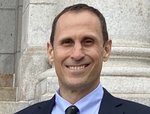

Everything begins with a story. Joseph Campbell believed this, and he knew a few things about stories.
Campbell lived from 1904 to 1987 and was considered one of the world's experts on mythology, the stories and legends told by human beings throughout time to explain the universe and our place in it. He wrote or edited 20 books that have influenced writers, artists, filmmakers, scholars, and students, including George Lucas, who credited Campbell's ideas as a key inspiration for the "Star Wars" saga.
Campbell's most influential work was "The Hero with a Thousand Faces," a book published in 1949. In this, he introduced the concept of the hero's journey, a universal narrative pattern found in myths and stories from cultures worldwide. Campbell identified common stages and archetypes in these narratives, highlighting the underlying unity of human storytelling. These timeless archetypes continue to have a powerful influence on the choices we make and the ways we live.
We are at a critical point in human history. We also are at a critical point in the history of Minneapolis. Especially when it comes to public safety and having a healthy city for all. Minneapolis Community Safety Commissioner Cedric Alexander is retiring after one year on the job. His appointment was lauded as a "seminal" moment in the city's history. But after Alexander earned $334,000 in annual salary as Minneapolis' highest-paid staffer — more than Mayor Jacob Frey and Gov. Tim Walz combined — is the city making progress?
While some crimes are down, according to data tracked by the Minneapolis Police Department, 4,700 vehicles were reported stolen across the city in 2023 (as of July 16). That's about 24 per day, a 70 percent increase from 2022 and double the average of the past three years by July. At this pace, Minneapolis will exceed last year's record-high 6,100 car thefts, the Star Tribune reports. Meanwhile, across the river in St. Paul, car thefts are down 32 percent from a year ago, the result of proactive policing tactics and taking repeat offenders off the streets.
Many of the repeat offenders are kids. Many of them are stealing Kias and Hyundais, the preferred car of choice for thieves. One reason for the trend, authorities say, is the "Kia Boyz," a social media challenge that encouraged teenagers to steal Kia and Hyundai cars and post the results on TikTok, Snapchat and YouTube for social media clout.
Minneapolis is taking steps to curb this destructive behavior. Minneapolis Police Chief Brian O'Hara has instructed officers to request that underage suspects be held in custody and face a judge instead of being released pending charges. In June, Hennepin County Attorney Mary Moriarty announced the launch of a new collaboration with local police to combat youth auto theft.
"We cannot ignore early warning signs that a child is headed down the wrong path," Moriarty said. "Youth stealing cars and driving dangerously puts lives at risk and is unacceptable. But what we adults have been doing is not enough. This initiative gets the system and community working together to help kids and families who are at risk, and to intervene early before a kid hurts themselves or someone else."
Targeting individuals stealing cars (or committing any crime) can reduce offenses. Taking measures to intervene and create accountability are steps in the right direction, but what else can we do as a community to address the root causes of negative behavior? How can we work together to help prevent crime from happening in the first place?
The struggle between right and wrong is nothing new. All humans deal with this struggle. For youth, the struggle is more pronounced since they are still developing. Social media has compounded the problem.
How can we do more to create environments and opportunities that encourage youth to make the right decisions, where youth get "clout" for strengthening their communities instead of hurting them?
As Joseph Campbell said in "The Power of Myth," his beloved conversations with journalist Bill Moyers, "Our life evokes our character, and you find out more about yourself as you go on."
We all have the power to change the story. We can create the community we want to see. It's a choice.
The dark side is greed, the fear of change, the inability to let go. Holding on to things leads to anger and hate. This leads to suffering. The light side brings calmness and peace.
The hero's journey is a metaphor for personal growth, self-discovery, and the universal human quest for meaning. It represents the trials, challenges, and transformations we encounter in our own lives as we embark on our individual journeys of fulfillment and self-realization.
There's a hero in each one of us. We just have to awaken our higher nature.
Comments
No comments on this item Please log in to comment by clicking here